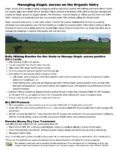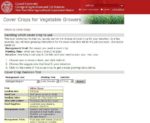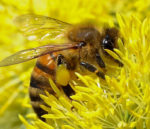Showing 1-4 of 4 results
How Alive is My Soil?
This guide presents soil testing methods that can be performed in the field by farmers, gardeners, or anyone who desires to understand and appreciate soil from a different perspective. While these tests aren’t intended to be a replacement for sending soil to a lab, they can be considered complementary to annual or biannual lab analysis.

Managing Staph aureus on the Organic Dairy
Staphylococcus aureus is a bacterium that causes mastitis in dairy cattle. Staph aureus mastitis is highly contagious and can easily spread among the herd. Organic dairy farmer Katie Webb Clark conducted a Northeast SARE Farmer Grant project to test milking hygiene and preventative management protocols used in the U.S. and New Zealand, trialed Manuka honey […]

New York Cover Crops Decision Tool
This is an online tool to help you quickly narrow the choices of cover crop for your situation. In a few seconds, you will have growing instructions for the cover crop that will do the job you need. Access the Cover Crops Decision Tool now. It is designed for the soil, climate, cropping practices and […]

Native bees and flowering cover crops
While managed colonies of European honey bees are most frequently used for crop pollination, wild or native bees commonly provide the same pollination services for ‘free’ without the costs of renting or maintaining honey bee hives.